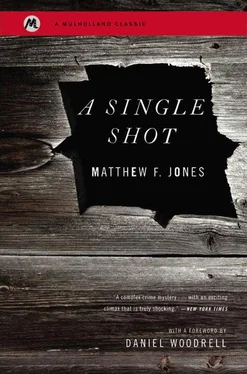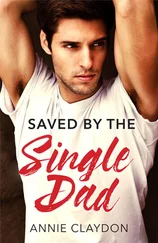An engine roars to life outside.
In one motion, he rolls off the couch and fumbles beneath it for the .45. Powerful lights intrude through the trailer’s back windows. The engine exhorts a labored whine. The lights get brighter. John grasps the gun, cocks it, and jumps up. The engine’s pitch ascends to a high-revved torque. “Son of a bitch’ll ram the trailer!” thinks John.
He dashes away from the sound toward the front deck door. He’s three-quarters there when the bottom of his bare foot feels as if it’s been shot. He goes down. Behind him, the lights blink off. The engine upshifts, reaches a crescendo, then slowly recedes.
Through the broken glass of the deck door, John watches the outline of the vehicle, darker even than the surrounding dark, vanish down the hollow road.
Panting heavily, he gets to his knees. He fumbles for the wall switch and turns on the light. Glass from the door’s middle panel lies in fragments on the linoleum floor. A piece of it has lodged in his foot, which is bleeding.
He stands up, then, trailing blood, tiptoes through the glass and down the hall to the bathroom, where he gets a towel, tweezers, gauze, waterproof tape, and a bottle of peroxide. He brings everything back to the couch, sits down, and, mumbling a string of pained curses, with the tweezers pokes around in the wound for the glass. His foot trembles. So do his hands. He laughs giddily from pain and at his shaking extremities, then loudly commands himself to shut up and act like a man. Soon he finds the glass, a half-a-peanut-sized chunk, and pulls it out. He pours peroxide on the towel and, wincing, cleans the wound, which is not very deep, then tapes gauze around it.
Afterwards, he is drenched in sweat. His heart beats loud in his ears. He pinches the glass chunk in the tweezers, holds it up to the light, and stares at it. He imagines himself as the glass, the dead girl his wound, and Waylon, Obadiah Cornish—and maybe Simon Breedlove—the tweezers. Aloud, he asks the girl how she had ever fallen for a guy like Waylon, who obviously grieved more for his lost money than for her. He gets mad thinking about it and tells her so. “Look how he disrespected your body and even when you was alive made you throw out your history like it didn’t matter!”
He places the glass chunk on the coffee table, then leans back against the couch, and, gazing at the blank television set, remembers it playing when he fell asleep. He leans forward and sees that the set is still turned on and plugged in. “Ain’t that great? Along with the rest of it, the fuckin’ tube is shot!” Then, lowering his voice, he tells the girl, “This Waylon guy’s a loser. You should never a’ run off with him in the first place, then you w’udn’t a’ been in the quarry and ’id still be alive and I w’udn’t be respons’ble for ya!”
He straightens up, leans forward, puts on his socks and boots, then gets up, goes into the kitchen, and makes a pot of coffee. He turns on the deck light. The sky is starting to lighten some. The fog is still thick. In places, it’s as high as the trees. From the upper pasture comes the invisible mooing and bell-jangling of Nobie’s herd. Any minute will sound his hollow shout. John thinks of Abbie Nobie and her empowerment theory. “I’d guess she’s about the same age as you,” he tells the dead girl. “She worries after me. Reckon she thinks I’ve become like a hermit without Moira. When Nolan was here, she used to come up and beg Moira to hold him and sometimes Moira would call her ’count of Nolan was colicky and Abbie was so good at gettin’ him to stop crying. Moira said she’s got a love in her heart and the kid could feel it.”
From the kitchen closet he takes the broom and dustpan, then carries them over to the deck doorway, lays the dustpan on the counter, and starts sweeping up the glass. “Long’s we got the money,” he tells the girl, “I guess they won’t kill me.” He sweeps out from beneath the table, along with several small chunks of glass, a fist-sized stone that is wrapped in yellow paper and circled by a rubber band. John kneels down, picks up the stone, and removes the paper. Ink writing appears on one side. John smooths it out on the floor and reads:
Two eyes fer an eye. Two teeth fer a tooth. We gut your wife, murdrer. We gut your kid. Git the package the Hen. Or Bang! Bang!
P.S. Why don’t ya call the law? Hah. Hah.
Suddenly he is aware of his own mental denseness, of his intellectual shortcomings. His stupidity looms like a brick wall between uncentered anger and thought. He tries to remember ever getting an A in school for anything but gym, and can’t. The unfairness of the world hangs before his unconscious gaze like a grotesque masterpiece.
Beneath him at the kitchen table, his legs hop up and down. His hands shake. His vision is marred by floating cells. Adrenaline courses like a drug through him. He can’t sit still, yet his energy is unfocused. He jumps up, runs over to the gun rack, removes every weapon and shell box, then sits down on the living-room floor, tests the mechanism of each gun, looks down its barrel to see that it’s clean, then loads it. He cocks the Winchester thirty-aught-six and returns it to the rack. Then he puts the .45 in his belt, the 12-gauge in a cabinet next to the refrigerator, the .22 pistol behind the bathroom toilet, the .30-30 Greener beneath his bed, and the 16-gauge behind the basement freezer.
He runs back upstairs and dials Moira’s number. The sky out the kitchen window is gray. What wind there was has died down. It will take most of the day for the fog to move. The phone rings four times. Five. The air through the screens is warm and filled with birdcalls. Seven rings. Eight. John rubs his eyes, removes his hand, and waits for his vision to clear. The phone is picked up. A man says, “Hello?”
“Let me talk my son,” says John.
“What?”
“Put him on.”
“I’m afraid you’ve got the wrong number.”
“He better be there, you bastard.”
“The only child here, friend, has a vocabulary of less than half-a-dozen words.”
“Wait!”
“What?”
“You didn’t tell me where to leave the money.”
The phone clicks dead.
He sits naked in the unstoppered bathtub beneath the shower’s hard stream of cold water, unconsciously reflecting on how the world’s lee and sway is as paralyzing to him as it had been to his father. He remembers his father pacing back and forth in the kitchen at night, loudly cursing while blindly punching and kicking appliances as if the machines were his creditors and cancer, “The bastards! The dirty, fucking bastards!”
When he steps from the tub, he is beet-red. He rebandages his foot and shoulder, then puts on a clean pair of jeans and T-shirt. The dull light of the heavily fog-shrouded morning comes through the bedroom window. “Nothing off this mountain is real,” he thinks. “If I sit here and do nothing, nothing will be lost.” Then he looks at Moira’s and Nolan’s pictures on the headboard and knows it’s not so. In the living room, he calls their apartment again. This time there is no answer. He redials, lets the phone ring twenty times, then hangs up. He has no idea what to do. He wishes the whole world were as easy as tracking something down and shooting it. He goes down-cellar.
He opens the freezer, takes out a couple of venison steaks, and stares at one side of the girl’s made-up face with its wide-open eye. The smell has dissipated. “I’m trying to figure things out,” he says, “but I got no fuckin’ idea.” He puts the steaks back, closes the freezer, and locks it. He runs around collecting the guns that he had hidden, then starts rehiding them in different places. He is on his way out to the woodshed with the 16-gauge when the phone rings. He goes back and answers it.
Читать дальше












